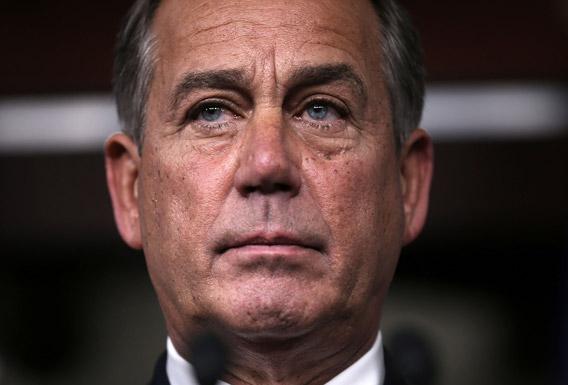Washington is once again at an impasse over fiscal matters, and once again the overwhelming majority of the intransigence comes from the Republican Party, which continues to rigidly reject any deal that includes any meaningful increases in tax revenue.
Nonetheless, the conventions of deficit scoldery mandate that the mere existence of disagreement shows that both sides must be to blame. Thus the Washington Post editorial board concludes that “Republicans are wrong to resist further revenue hikes” but still wonders “why is Mr. Obama not leading the way to a solution?” David Brooks complains that Obama “has become a participant” in “stale debates” and should instead unilaterally “fundamentally shift the terms” of politics. Ron Fournier at National Journal says Obama is “ultimately responsible for the success or failure” of negotiations, no matter what his opponents say.
This is pernicious nonsense. The president of the United States has many powers at his disposal, but the ability to pull a Jedi mind trick and force congressional opponents to agree to deals they don’t favor isn’t among them. It’s true that the ideas Obama has put on the table aren’t perfect, but at least he has put ideas out there and shown some flexibility. The person who has to act now is the one person who actually can change the dynamic: House Speaker John Boehner.
It is Boehner, not Obama, who must lead and find a way to a solution. It is Boehner, not Obama, who has the ability to move Washington beyond the endless stale debate, and it is Boehner, not Obama, who is ultimately responsible for the success or failure of policymaking in the 113th Congress.
Ryan Lizza, profiling Majority Leader Eric Cantor in The New Yorker, definitively nails down what many inferred at the time: Boehner and Obama were at one point close to a big deal, and then Boehner pulled the plug for fear of a rebellion on his right:
In June of 2011, the President and the Speaker began working toward a Grand Bargain of major tax increases and spending cuts to address the government’s long-term budget deficits. Until late June, Boehner had managed to keep these talks secret from Cantor. On July 21st, Boehner paused in his discussions with Obama to talk to Cantor and outline the proposed deal. As Obama waited by the phone for a response from the Speaker, Cantor struck. Cantor told me that it was a “fair assessment” that he talked Boehner out of accepting Obama’s deal. He said he told Boehner that it would be better, instead, to take the issues of taxes and spending to the voters and “have it out” with the Democrats in the election. Why give Obama an enormous political victory, and potentially help him win reëlection, when they might be able to negotiate a more favorable deal with a new Republican President? Boehner told Obama there was no deal. Instead of a Grand Bargain, Cantor and the House Republicans made a grand bet.
Whatever the merits of that strategy at the time, the gamble clearly hasn’t paid off. It’s time for Boehner to admit as much, come back to the table, and act like a statesman by offering a bold proposal that will split his caucus and risk his speakership. Boehner needs to acknowledge that Obama has repeatedly been offering the kind of large spending cuts that Republicans say they want, and learn to take yes for an answer. Tax revenue is the price Obama has consistently demanded in exchange for spending cuts, and Boehner could be statesman of the decade by agreeing to take the deal.
He doesn’t need to embrace new revenue, mind you. He doesn’t need to say he’s eager to raise taxes or even that he favors it. He just needs to say that he’s willing to give ground in order to get what he wants.
This would give Boehner the chance to push Democrats off some of their gimmicky thinking on taxes. The White House’s view that in an era of high inequality the rich should pay more is perfectly reasonable, but Obama’s politically motivated insistence that the rich be the exclusive payers of higher taxes is paralyzing. A sensible, economically efficient, loophole-closing tax reform such as the one proposed by Diane Rogers Lim for the Hamilton Project would raise more money from rich taxpayers than middle class ones but at least some Americans all across the income spectrum would pay somewhat more.
A big concession on taxes would also give Boehner the high ground in the debate over spending. For much too long, GOP intransigence has papered over divides in the Democratic coalition. Democrats—correctly—like to tout the role of federal spending on R&D, infrastructure, and education as important to economic growth. But the lion’s share of nonmilitary spending doesn’t go to investments in the future, it goes to subsidies for the elderly. Obama has often stated a desire to curb this spending in the context of a balanced deal, but that position has always been controversial within his party. It’s never truly been clear how many Democrats Obama could bring along with him for a deal, and we’ve never had to find out because there’s been no Republican partner.
No entitlement cuts without tax hikes is a comfortable common denominator view for Democratic leaders, uniting the liberal and moderate wings of the party. And it’s a potent electoral combination that clearly polls better than the all-cuts alternative. Boehner is absolutely correct to say that the long-run fiscal gap is mostly a question of excessive projected entitlement spending and not tax shortfalls. But if Boehner really wants to reduce that spending, he must show some leadership and bring at least a fraction of his caucus to the table, ready to compromise.
